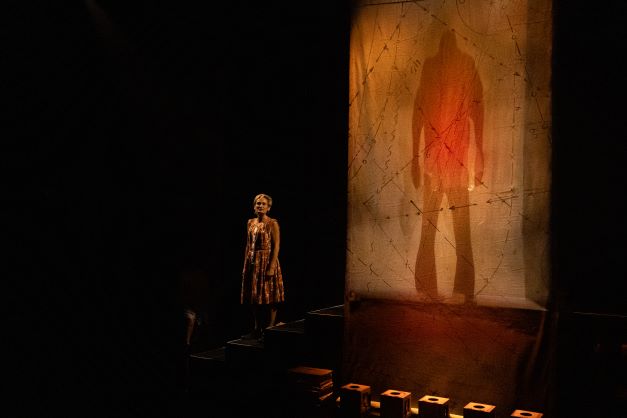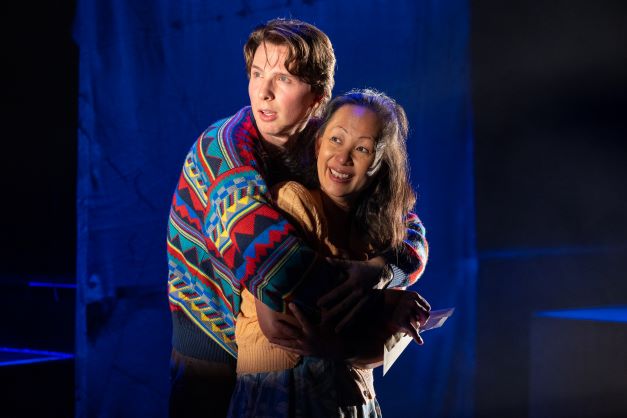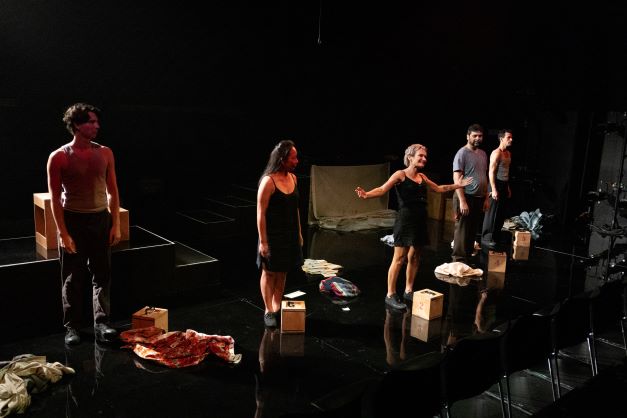
‘Boy, Lost’ // Belloo Creative and Queensland Theatre
‘Boy, Lost’ was thought-provoking.
Belloo Creative has created a wonderful and thought-provoking piece of theatre, staged in the beautiful Diane Cilento Theatre at Queensland Theatre. As a proud, female-led Australian theatre company, Belloo Creative is committed to bringing people and stories out of the shadows.
Their latest production, ‘Boy, Lost’ was adapted by Katherine Lyall-Watson from Kristina Olsson’s 2013 memoir that details the story of her mother and the children stolen from her arms. The story follows a separated family as they navigate the horrors of domestic violence, sickness, mental health, racism and family values.
First commissioned seven years ago by the incomparable Wesley Enoch and Queensland Theatre, Belloo Creative has worked closely with Kristina and Sharon Olsson, and Peter Preneas to ensure this story was told with sensitivity. ‘Boy, Lost’ extrapolates many dramatic techniques within its structure; from the Suzuki-inspired method, Brechtian Techniques, verbatim theatre as well as some fantastic physical choreography, which when all combined creates something special.
Verbatim theatre is always a challenge to write and produce as it puts real-life stories on stage and ‘Boy, Lost’ is a fantastic example of this style. It is clear that the creative team worked extensively with the family to ensure every single aspect of this production was thought-out and well-developed.
Ensuring this story was at the forefront of the production was a challenge for the production and creative team, but they sure did deliver. Set and costume design by Penny Challen was intricate and useful. Having actors be fluid with gender and ethnicity was integral to this production and Challen assisted with this ingeniously. The set was based around two horizontal platforms with stairs doubling as prop boxes. There were four thin scrims hanging from the roof with maps, reminiscent of olden cartography on the front. Costuming was simple, utilising a basic singlet and pants for all actors, who would then change only small items, such as blazers, hats and cardigans, to semiotically convey different characters.
Lighting design by David Walters was fantastic. With a career spanning 40 years, Walters is an experienced and creative lighting designer. All technical elements in this production were top-notch and faultless, including the lighting by Walters. The design utilised lots of colours, particularly yellow which created the 40-70s time period the play was set in. Backlighting was used on the scrims to create shadows of the actors; while a simple idea it was extremely effective. Another fantastic idea was the lighting on the prosthetic leg, as the design team utilised a prosthetic leg to represent the Polio that Peter had rather than having the actor limp and pretend. There was a point where the doctors were operating on Peter’s leg and the cast used light boxes as a theatre light, flashing at the point when the surgery went wrong.
Sound design by Guy Webster was equally as superb, with music and sound constantly being played throughout this 75-minute play. Webster delivered an engaging soundscape throughout the entirety of the production. Working with Morgan Francis, the composer, they both brought to life the emotions and deep feelings within this production.
Direction by Caroline Dunphy was, in a word, perfect. Under Dunphy’s eye, there was complete cohesion and energy within the ensemble. One addition to this production was the inclusion of a Disability Sensitivity Consultant, and it’s clear Madeleine Little worked with Dunphy and the cast to ensure disability was portrayed sensitively and correctly. This wasn’t just the case with physical disability either, as Little must have worked with all the cast who portrayed mental health issues incredibly tenderly, such as panic attacks and night terrors.
Another highlight of ‘Boy, Lost’ was its stunning ensemble cast. Morgan Francis played the character of Peter or the Boy that was lost. Francis is a stupendous actor, really bringing the audience into Peter’s emotions and thoughts through ingenious use of vocality and physicality. Colin Smith played numerous characters in this production and was simply fabulous. Swapping roles is hard for any actor to complete, however, Smith transitioned between many characters with ease. Smith is an extremely experienced actor and it can be seen throughout this production.
Zoe Houghton was incredibly connected to the story. Houghton also played multiple characters but was a standout and hilarious as the 9-year-old girl. The audience believed Houghton was a child in this role, not an adult which is a true testament to Houghton’s acting skills. Hsiao-Ling Tang again played multiple characters in this production however played Peter’s mother with elegance and skill. Tang’s sensitive work regarding mental health made their performance feel authentic and real, and deliver this troubled character with much finessel. Rounding out this star-studded cast was Stephen Geronimos, who played Peter’s abusive father along with many other characters. Geronimos’ acting was something we loved to hate, as the audience loathed Peter’s father but revelled in Geronimos’ acting skill.
‘Boy, Lost’ was such an impacting production, that it will leave viewers talking about it all the way home (even as far as the Gold Coast, if you’re like this reviewer). This show gave audiences a true insight into the horrors of child institutionalisation and racism. We as a country have not done enough to recognise these children and help them. The Stolen Generation and the Forgotten Australians have generational trauma and PTSD more than we can know and we need to tell their stories to bring the atrocities of our country to the forefront, because then, finally, we might see change.
‘Boy, Lost’ performs until Saturday, 19 November 2022 at Diane Cilento Studio, Queensland Theatre. For more information visit Queensland Theatre’s website.
Photography by Cinnamon Smith








